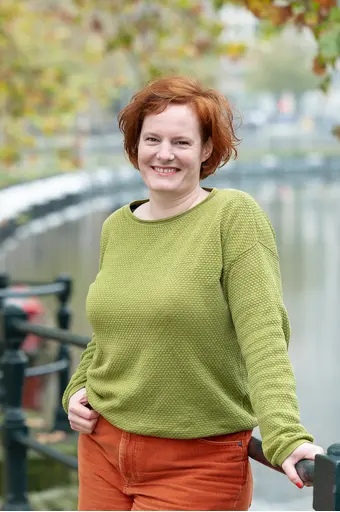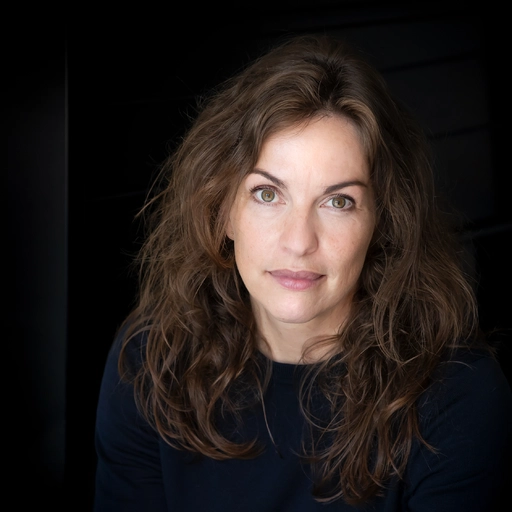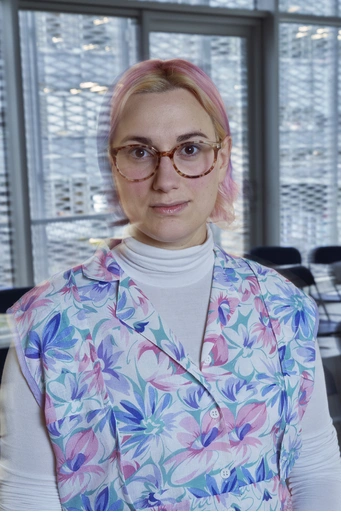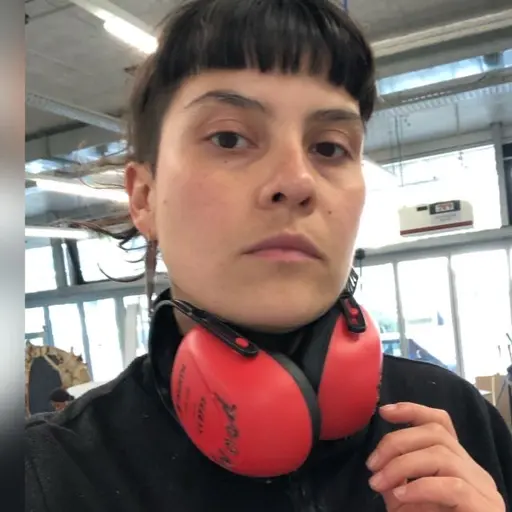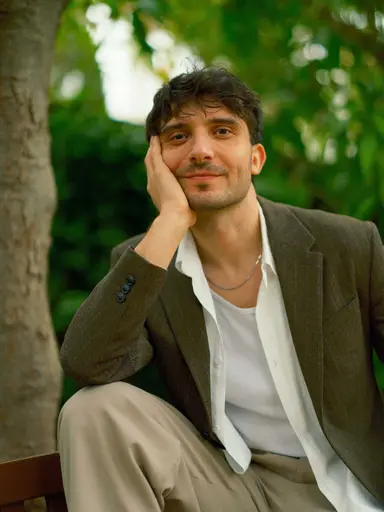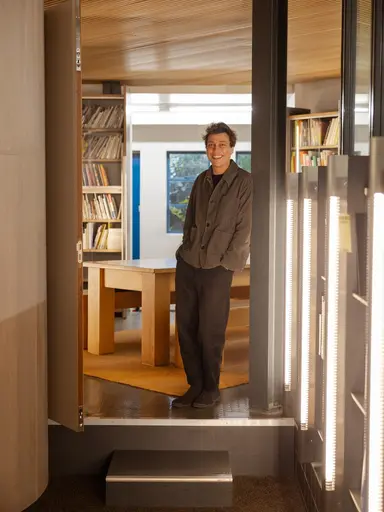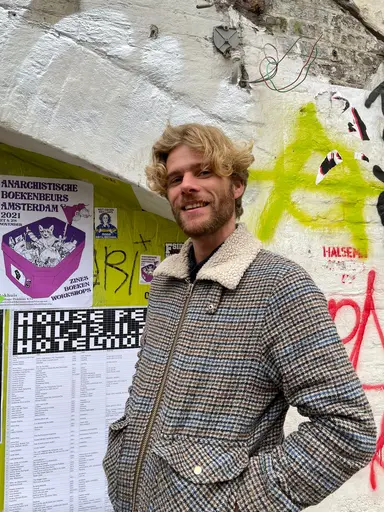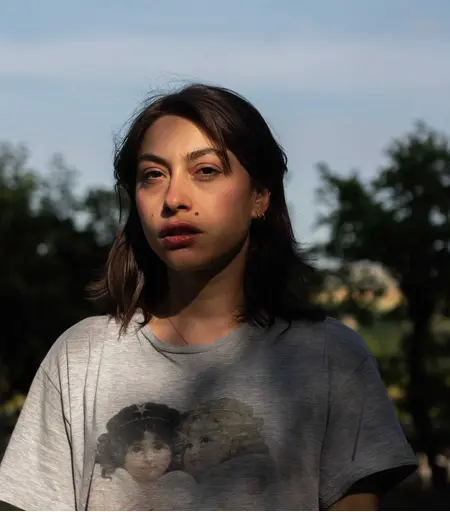Between November 2024 and March 2025, the research group Plot(ting), part of the Lectoraat Art & Spatial Praxis, hosted Tactics of the Plot: Reimagining Tools and Methods for Resistance & Collective Futures. This project, a collaboration with the Institute of Network Cultures, brought together a diverse group of makers, researchers, activists, and those working across disciplines whose practices can be examined through Sylvia Wynter’s concept of the plot. Participants included Inte Gloerich, Elisa Guiliano, Wouter Stroet, Sepp Eckenhaussen, Mayis Rukel, and Lina Bravo Mora.
Plot(ting) explores the plot as a model for artistic and research-based practice, investigating how artists, writers, and scholars resist institutional and capitalist frameworks while forging different ways of understanding, relating, and creating. How do artists and artistic researchers define their ground and claim space while resisting co-optation by the very systems they seek to challenge?
This project considers these questions as landscapes of sites of resistance against forces of domination, exploitation, gentrification, and commodification. Rather than opting for a conventional panel discussion, we invited participants to engage in an experiential format guided by Laura Dubourjal and Linnea Langfjord Kristenssen. Our aim was not just to talk about tactics and tools for resistance but to enact them together.
This project considers these questions as landscapes of sites of resistance against forces of domination, exploitation, gentrification, and commodification. Rather than opting for a conventional panel discussion, we invited participants to engage in an experiential format guided by Laura Dubourjal and Linnea Langfjord Kristenssen. Our aim was not just to talk about tactics and tools for resistance but to enact them together.
A Different Approach to Collective Research
To prepare for the discussion, we organized a series of preliminary meetings where we mapped out each participant’s methods, tactics, and tools—not through conventional introductions but through breath, movement, sound, laughter, food, and games. We intentionally slowed down, repeated, and rehearsed.
The project framework draws from techniques of the Theatre of the Oppressed and the Milan Women’s Bookstore Collective, using improvisation and embodied practice to deepen engagement. During the final event, moderated by Laura Dubourjal and Linnea Langfjord Kristenssen participants enacted and shared their research in a performative discussion, using keywords and concepts as characters and their conversations as scenes.
This approach invited us to consider:
The project framework draws from techniques of the Theatre of the Oppressed and the Milan Women’s Bookstore Collective, using improvisation and embodied practice to deepen engagement. During the final event, moderated by Laura Dubourjal and Linnea Langfjord Kristenssen participants enacted and shared their research in a performative discussion, using keywords and concepts as characters and their conversations as scenes.
This approach invited us to consider:
How do researchers, artists, and activists sustain their practices and form alliances?
What can be learned from working together through embodied practice?
How does repetition transform a collective conversation?
What Comes Next?
We are currently compiling and editing the materials collected during the project and will be sharing them on our Plot(ting) platform later this Spring. Stay tuned for more!
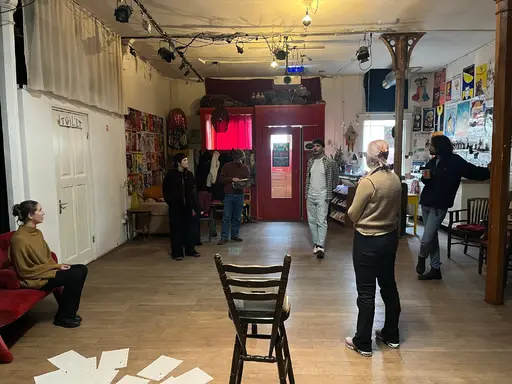
Lina Bravo Mora is a social anthropologist and artist from Bogotá, Colombia. With a decolonial perspective on pedagogy and artistic research. She works in co-creating educational and sensorial spaces and programs for life-sustaining, land-based emancipatory and liberatory practices. She works as a facilitator and initiator of experiences.
Lina Bravo Mora: "The Plot(ting) research group was a nurturing space to reflect with other socially engaged practitioners. The body-based methodology created trust within me to bring my most honest self to the group and to address the challenges of my work and the opportunities to radicalise and strengthen it. As an artist working with NGOs in spaces of repression and educated within art institutions, thinking collectively with Wynter's notion of the Plot felt like a support to rely on in these uncertain times, within untrustworthy institutional spaces. "
Mayis Rukel is a Turkish artist, writer, and filmmaker based in Rotterdam. His work explores magical research, liberatory remembering, radical pedagogies, child-woven futures, and befriending ghosts. He received the GRA Awards for Autonomous Arts 2020 and Mondriaan Fonds Kunstenaar Start (2023). His short fiction The Pendant was featured at the Nederlands Film Festival (2020), and his feature-length fiction-documentary Movement Song was part of Mondriaan Fonds Prospects 2025.
Mayis Rukel: "In this research group, we explored movement through the bodymind, particularly guided by Sylvia Wynter’s concept of the Plot and its associations.
As Radical Roots, Lina Bravo Mora and I facilitate storytelling spaces centered on food and migration in Dutch refugee centers (AZCs). These spaces operate under a dominant narrative: migrants are a population to be managed; contained and processed to maintain order, culture, and economy. Radical Roots challenges this by asserting unconditional welcome, recognizing that migration is deeply tied to histories of colonialism and plantations. Immigrants are not burdens to be managed but humans deserving of love, dignity, and belonging; carrying wisdom, stories, and skills. Our work asks: Can we share all that we bring here and live together?
While AZCs are sites of surveillance, they are also spaces of solidarity; where people form friendships, exchange survival strategies, and build belonging. In this way, they reflect Wynter’s Plot. Radical Roots cultivates this Plotting space through shared meals and stories.
Using Augusto Boal’s Theater of the Oppressed, we reenacted moments of institutional conflict, uncovering new dimensions of agency. This somatic process revealed how narratives unfold, how oppression is embodied, and how resistance emerges. Through time, reflection, and collective storytelling, our research group became a community of shared stories, practices, and methods. "
As Radical Roots, Lina Bravo Mora and I facilitate storytelling spaces centered on food and migration in Dutch refugee centers (AZCs). These spaces operate under a dominant narrative: migrants are a population to be managed; contained and processed to maintain order, culture, and economy. Radical Roots challenges this by asserting unconditional welcome, recognizing that migration is deeply tied to histories of colonialism and plantations. Immigrants are not burdens to be managed but humans deserving of love, dignity, and belonging; carrying wisdom, stories, and skills. Our work asks: Can we share all that we bring here and live together?
While AZCs are sites of surveillance, they are also spaces of solidarity; where people form friendships, exchange survival strategies, and build belonging. In this way, they reflect Wynter’s Plot. Radical Roots cultivates this Plotting space through shared meals and stories.
Using Augusto Boal’s Theater of the Oppressed, we reenacted moments of institutional conflict, uncovering new dimensions of agency. This somatic process revealed how narratives unfold, how oppression is embodied, and how resistance emerges. Through time, reflection, and collective storytelling, our research group became a community of shared stories, practices, and methods. "
Sepp Eckenhaussen is an art writer, organizer, and researcher. He works at the Institute of Network Cultures and the Caradt research group of the St. Joost Academy. Sepp runs the research project Creative Reset and hosts the podcast Art in Permacrisis. From 2020 until 2023, he co-directed Platform BK.
Sepp Eckenhaussen: "Tactics of the Plot was a beautifully contradictory experience. The intimate setting, the body excercizes, and the relaxed openness of the conversations made it feel like a pause from the grind of everyday life. At the same time, the politically relevant topics and stories contributed by the participants, the speculative focus on tactics and strategies, and the fact that everyone present brought the experience of activist practices into the space, gave me the sense that Tactics of the Plot was profoundly engaged. The carefully adapted and implemented Theatre of the Oppressed-method allowed to bring our conversations to a level of unrushed organic reflections that I will foster, take forward, and hopefully be able share with others in the future."
Through unravelling tales of linear progression I seek to map out the blurriness of our world. By adapting and appropriating modern contemporary cartographic techniques, such as photogrammetry, and the use of aerial and satellite imagery. I aim to question the authority that decides what is and what is not in focus to re-orient and ignite curiosity.
Wouter Stroet: "Tactics of the plot has been a great method to research and reflect on my social/activist practice as well as on the practices of the other participants. It was refreshing and valuable to use a method that teaches you to slow down and research through and with the body opposed to the more conventional methods."
Inte Gloerich is a researcher focussing on the cultures and imaginaries around emerging media and technologies, specifically in relation to epistemologies and power dynamics.
Inte Gloerich: "My experience in the research group was inspiring, confronting, freeing, and grounding. At the first session I attended, the friendly and warm setup made me immediately feel at ease, ready to participate in performative activities with a group that was entirely new to me. We soon got to know each other through the lens of the plantation and the plot — giving a very particular insight into the diverse dimensions of the struggle for difference within the overwhelming extractive and exploitative dynamics that we find ourselves in. Even though I engage with these topics in my own work, and I experience this struggle in my own life, I was inspired by the activism and practical power of other participants. It made me reflect on my own approach and look for ways in which I can do more. I also felt that the diversity of voices in the group were a great showcase of how activist commitments can take all sorts of shapes, and that it is in my own situatedness that I can do most to contribute to creating plots of difference, resistance, and care."
Elisa Giuliano is a curator, researcher and theatre maker. She is currently a lecturer at MA Curatorial Studies at ZHdK and a Curatorial Fellow at HBK Braunschweig.
Being part of Tactics of the Plot was a transformative experience that deepened my engagement with Sylvia Wynter’s work and its radical potential for action. Drawing on Wynter’s theatrical framework—which reimagines ceremony and ritual as ruptures capable of destabilizing dominant ideologies—the research group became a space for critical inquiry and embodied experimentation. By integrating methodologies like the Theater of the Oppressed, we actively rehearsed Wynter’s insights, translating theory into collective practice.
